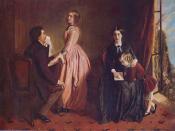Sexual passion is the underlying theme of the story that exists underneath the surface of the narrative, either as a result of haunting ghosts or mental unbalance. This unreleased passion is responsible for the traumatic experiences that lead to the sickness and death of two children that were under the care of the governess. Two main conclusions can be drawn from the plot in order to find the direct cause of the ordeal that the children, Flora and Miles, experienced during their stay at the Bly household. The two opposite conclusions that one can make are that either the governess is suffering from hacullanting ghosts and therefore through her own constant smothering she is emotionally hurting the children. Or, that the ghosts are real and actually haunting the governess along with the Bly manor. It is unclear whether the ghosts actually exist because the governess is not necessarily a reliable narrator.
The ghosts could merely be manifestations of her frustrated sexual desire for the master. No one else ever confirms seeing the ghosts. But, their existence is not also not denied. The ambiguity of perspective keeps the story open to different possible interpretations.
If the ghosts were not real, a logical conclusion could be made that the governess in fact manifested these apparitions in order to capture the interest of the master of the house. According to this theory, the governess wishes to impress the master of the house because she is in love with him. As a result of this unrequited love, the governess exceeds her authority in which she has to care for the children. Although the governess only sees the master twice, it is mentioned in the story that "it was the beauty of her passion"�, in which fueled her desires for him.
From the start, the master was not impressed by the governess. As a result of this, the governess felt as though she had to create something that threatened the children's lives. She did this so that she could come to their rescue and win over the master's affection. The governess unconsciously does this because she is sexually repressed as a result of a more influential super ego. On account of this, the governess cannot admit these motives to herself, which results in her halluctions of the ghosts. The governess goes to the extreme of creating a life-threatening situation for the children because the master basically states that he does not want to be bothered by any matters concerning the children. Therefore, the only way that she can capture his attention is by placing them in what seems to be a dangerous situation. The governess creates the ghosts as a result of her own wish fulfillment. She did this in order to set in motion a chain of events that would eventually lead to the sexually tension reducing approval of the master of the house. An example of this would be when the governess states " I set in motion the fine machinery to attract his attention to my slighted charms."� The governess is also constantly searching for the Master's approval, in which she is identifying with an aggressor. In the sense that, the master is not just the Master of the house but literally her master also. He creates the rules, and can also give punishment. To avoid this punishment and disapproval, the governess resorts to the extreme situation of creating the ghosts, as for reasons mentioned before. To prove evidence for this reasoning, the governess also states that " She did not know "" no one knew "" how proud I had been to serve him and stick to our terms."� When the governess carries out the master's orders and wishes, she gains a certain satisfaction in imaging that she has pleased him.
Another example or fact that the governess was creating the ghosts was when Flora became ill, after supposedly being taken across the river bank by Miss. Jessel, the governess convinced Miss. Grosse to take Flora to the Master's house. This was done in order to keep her away from the "ÃÂevil spirits'. The governess' reasoning to do this was in the hope that the master would take notice to the governess' deep concern for the children. From this recognition, the governess could begin to win over his endearment.
The governess obsessed over the master, indicating that she suffered from a frustrated sexual desire for him. Miles is the master's male heir, so he is the master of the household in his uncle's absence. The governess is equally obsessed over Miles, and she is also captivated with the incredible beauty of the children which strengthens the implications of an extremely frustrated sexuality. For example when Mrs. Grose left to bring Flora to the Master's house, the governess had personal time with Miles alone. The governess subconsciously planned this as a result of her desire to feel as though she was needed by and could serve a male figure. Even though Miles was just a young boy the governess still identified with him in a sexual manor.
Another point to be noted is that, the governess experiences her first ghost sighting while she is having a fantasy that the master will visit and commend her good work at Bly. Also, she sees the ghost on a tower. The tower can be viewed as a phallic metaphor. Therefore, only through metaphor the governess seems to express her sexual desires. The object of her desire is unattainable, and therefore she keeps displacing her desires onto other objects, like the children On the other hand the story is so ambiguous that the governess might actually be sighting ghosts that wander the grounds of Bly. If this were true, then the governess could be held accountable for her numerous reasoning for the many strange occurrences that took place. Therefore, the conclusion could be made that the governess was not suffering from sexual repression, but acted out of fear. The governess was fearful that she would not be able to protect the children from the ghosts because they were evil spirits. As a result of this fear, anxiety formed within the governess that was projected onto the children.
Even thought the ghosts are real and roam around Bly, they never truly harmfully haunted any of the people there. But, it was actually the governess that physically haunted the children with her unearthly surveillance of their activities and convinced Mrs. Grose to do what the governess pleased. For example, after her hysterical disruption by the lake with Flora and Mrs. Grose, the effects of her excessively possessive attitude toward the children become clear. Flora is terrified that the governess will come after her. Miles wants to get away from Bly and the governess. Consequently, because of her constant fixation with protecting the children she is the reason for their anxiety problems, which eventually lead to sickness and death. From this, one can conclude that the governess has a neurotic anxiety problem. She suffers from a form of neurotic anxiety called free-floating anxiety, in which she is regularly nervous and expecting something dreadful to occur. This anxiety is triggered by the appearance of the ghosts.
James's story never identifies who is to blame for the chaos at Bly. The common conclusion that one can infer is that the master is to blame. By disregarding his responsibility to provide a secure influence at Bly, he allows everything to decay into turmoil: children are sexually corrupted, ghosts walk the halls at night, governess' entertain sexual desires for the employers. Many allusions are strategically placed through out the story that may or may not have happened. Because the governess projects her own sexual repression onto Miles and Flora, she watches them closely. As a result, Flora begins to feel that the governess' strange obsessive behavior will haunt her forever, and Miles dies, probably because the governess suffocated him. The governess with held her desires and was unable to express them. Thus, she created two people that did express their desires and had a healthy relationship. These two people were the hallucinations of the governess, which took on the form of ghosts that threatened Bly. The governess suffers from delusions of her own wish fulfillment as a result of her sexually repressed desires that she had displaced toward the only male around her (the master of the house). Therefore, she created a situation in which she can play hero to the children, in order to win over his love.


